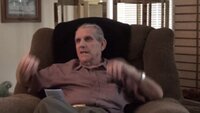| Title |
Harris, Wayne OH9_041 |
| Creator |
Weber State University, Stewart Library: Oral History Program |
| Contributors |
Harris, Wayne, Interviewee; Harris, Sam & Harris, Kandice, Interviewers |
| Collection Name |
Weber and Davis County Community Oral Histories |
| Description |
The Weber and Davis County Communities Oral History Collection includes interviews of citizens from several different walks of life. These interviews were conducted by Stewart Library personnel, Weber State faculty and students, and other members of the community. The histories cover various topics and chronicle the personal everday life experiences and other recollections regarding the history of the Weber and Davis County areas. |
| Abstract |
The following is an oral history interview with Wayne J. Harris, conducted on April 20, 2019, by Sam Harris. Wayne discusses his life, his experiences, and his memories. Kandice Harris, the video technician, and Shirley Harris, Wayne's wife, are also present during this interview.; The following is a video clip of an oral history conducted on 20 April 2019. In this video clip, Wayne discusses his memories of his family's involvement and in the automotive industry when he was a child. |
| Image Captions |
Wayne Jay Harris Circa 1955; Wayne Jay Harris 20 April 2019; Wayne Harris speaking about his family's involvement with the automotive industry |
| Subject |
Great Depression, 1929; World War, 1939-1945; United States. Navy |
| Keywords |
Cuba; Navy; Automotive Industry |
| Digital Publisher |
Stewart Library, Weber State University, Ogden, Utah, USA |
| Date |
2019 |
| Temporal Coverage |
1939; 1940; 1941; 1942; 1943; 1944; 1945; 1946; 1947; 1948; 1949; 1950; 1951; 1952; 1953; 1954; 1955; 1956; 1957; 1958; 1959; 1960; 1961; 1962; 1963; 1964; 1965; 1966; 1967; 1968; 1969; 1970; 1971; 1972; 1973; 1974; 1975; 1976; 1977; 1978; 1979; 1980; 1981; 1982; 1983; 1984; 1985; 1986; 1987; 1988; 1989; 1990; 1991; 1992; 1993; 1994; 1995; 1996; 1997; 1998; 1999; 2000; 2001; 2002; 2003; 2004; 2005; 2006; 2007; 2008; 2009; 2010; 2011; 2012; 2013; 2014; 2015; 2016; 2017; 2018; 2019 |
| Medium |
oral histories (literary genre) |
| Spatial Coverage |
Pleasant View, Weber, Utah, United States, https://sws.geonames.org/5779833, 41.31828, -111.99216; Cokeville, Lincoln, Wyoming, United States, https://sws.geonames.org/5821618, 42.08244, -110.95519; Havan, Havana, Cuba, https://sws.geonames.org/3553478, 23.13302, -82.38304 |
| Type |
Text; Image/StillImage; Image/MovingImage |
| Conversion Specifications |
Interview was recorded with a video camera.; Videos were stored to 6 TDK miniDV video cassettes; The 6 TDK miniDV video cassettes were converted into digital VOB Video Files; The VOB Video Files were combined using Adobe Premiere Pro and exported into 1 mp4 file. Transcribed using Express Scribe Transcription Software Pro 6.10 Copyright NCH Software. |
| Language |
eng |
| Rights |
Materials may be used for non-profit and educational purposes, please credit University Archives; Weber State University; Music from video clip is from uppbeat.io, https://uppbeat.io/t/monument-music/endless-inspiration, License code PEYVA4EE5YBLZ4MA; Music from video clip is from uppbeat.io, https://uppbeat.io/t/yeti-music/gentle-breeze, License code IWGKRYG7XHQOMZY0 |
| Source |
Harris, Wayne OH9_041 Weber State University Archives |
| Format |
application/pdf; video/mp4 |
| ARK |
ark:/87278/s6dw2swc |
| Setname |
wsu_webda_oh |
| ID |
104342 |
| Reference URL |
https://digital.weber.edu/ark:/87278/s6dw2swc |
| Title |
Harris, Wayne OH9_041 |
| Creator |
Weber State University, Stewart Library: Oral History Program |
| Contributors |
Harris, Wayne, Interviewee; Harris, Sam & Harris, Kandice, Interviewers |
| Description |
The Weber and Davis County Communities Oral History Collection includes interviews of citizens from several different walks of life. These interviews were conducted by Stewart Library personnel, Weber State faculty and students, and other members of the community. The histories cover various topics and chronicle the personal everday life experiences and other recollections regarding the history of the Weber and Davis County areas. |
| Abstract |
The following is an oral history interview with Wayne J. Harris, conducted on April 20, 2019, by Sam Harris. Wayne discusses his life, his experiences, and his memories. Kandice Harris, the video technician, and Shirley Harris, Wayne's wife, are also present during this interview. |
| Image Captions |
Wayne Jay Harris Circa 1955; Wayne Jay Harris 20 April 2019 |
| Subject |
Depressions--1929; World War, 1939-1945; United States. Navy--Officers |
| Keywords |
Cuba; Navy; Automotive Industry |
| Digital Publisher |
Stewart Library, Weber State University, Ogden, Utah, USA |
| Temporal Coverage |
1939; 1940; 1941; 1942; 1943; 1944; 1945; 1946; 1947; 1948; 1949; 1950; 1951; 1952; 1953; 1954; 1955; 1956; 1957; 1958; 1959; 1960; 1961; 1962; 1963; 1964; 1965; 1966; 1967; 1968; 1969; 1970; 1971; 1972; 1973; 1974; 1975; 1976; 1977; 1978; 1979; 1980; 1981; 1982; 1983; 1984; 1985; 1986; 1987; 1988; 1989; 1990; 1991; 1992; 1993; 1994; 1995; 1996; 1997; 1998; 1999; 2000; 2001; 2002; 2003; 2004; 2005; 2006; 2007; 2008; 2009; 2010; 2011; 2012; 2013; 2014; 2015; 2016; 2017; 2018; 2019 |
| Medium |
oral histories (literary genre) |
| Spatial Coverage |
Pleasant View, Weber, Utah, United States, https://sws.geonames.org/5779833, 41.31828, -111.99216; Cokeville, Lincoln, Wyoming, United States, https://sws.geonames.org/5821618, 42.08244, -110.95519; Havan, Havana, Cuba, https://sws.geonames.org/3553478, 23.13302, -82.38304 |
| Type |
Text; Image/StillImage |
| Language |
eng |
| Rights |
Materials may be used for non-profit and educational purposes, please credit University Archives; Weber State University; Music from video clip is from uppbeat.io, https://uppbeat.io/t/monument-music/endless-inspiration, License code PEYVA4EE5YBLZ4MA; Music from video clip is from uppbeat.io, https://uppbeat.io/t/yeti-music/gentle-breeze, License code IWGKRYG7XHQOMZY0 |
| Source |
Harris, Wayne OH9_041 Weber State University Archives |
| Format |
application/pdf |
| Setname |
wsu_webda_oh |
| ID |
104453 |
| Reference URL |
https://digital.weber.edu/ark:/87278/s6dw2swc/104453 |





